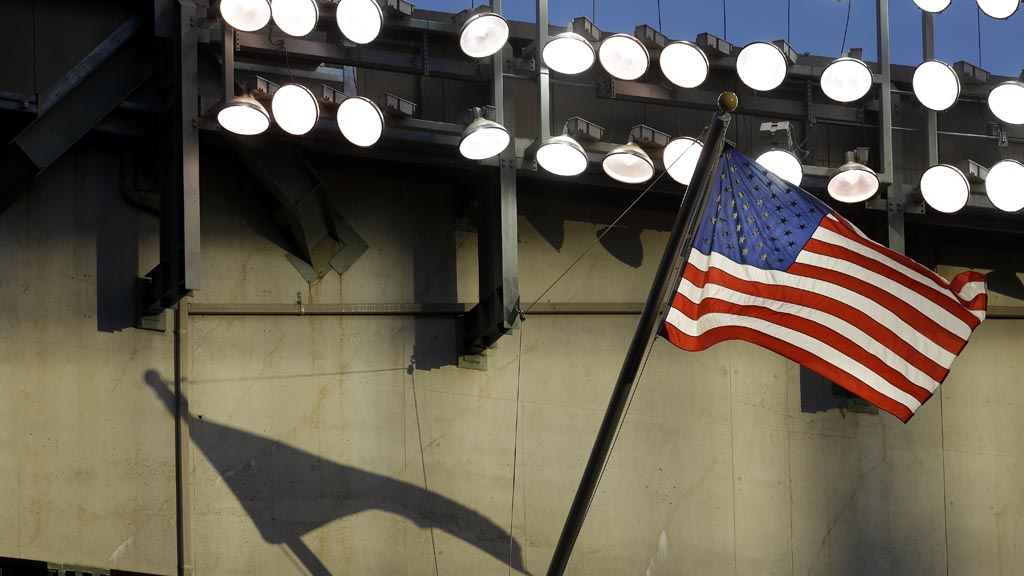Carrie is back, but the west is over
A complex series of unanswered questions – Paul Mason looks at America’s sudden loss of diplomatic coherence and finds an uneasy Homeland.
It is one of the most dense narrative minutes you’ll ever watch: a girl, trumpet practice, the first Iraq war. Clinton after the Nairobi bomb, then 9/11. Now the girl is grown up, a CIA agent, and history flickers by: Afghanistan, Fallujah, a militarised America – and she’s striding through the Arab mean streets glancing over her shoulder at a threat that never dies.
It is the title sequence of Homeland, and its subtext is clear. Carrie Mathison’s generation has grown up knowing only war, terror, militarism and the surveillance state. They have seen political morality hollowed out, the interlocking networks of corrupt lawmakers, venal spies and extrajudicial killers become the commonplace backdrop for TV drama. It is the price war-weary America has had to pay for remaining the global superpower.
While the fictional US president in Homeland can sanction air strikes on Iran, the real presidency of Barack Obama could not even decide to arm the Syrian rebels.
Except that it’s not anymore. Between the end of casting and the start of filming season one, the Arab Spring occurred. History spiralled away from the scenario of Homeland: secularism and democracy tore through the cities where Carrie’s one-woman fictional fight with jihadism takes place.
Then, on the eve of season three, during the Syria crisis that followed the sarin attacks of 31 August, America’s diplomatic willpower has collapsed.
While the fictional US president in Homeland can sanction air strikes on Iran, the real presidency of Barack Obama could not even decide to arm the Syrian rebels. It twice drew “red lines” over chemical weapons use by Bashar al-Assad, but did nothing. It threatened limited military action against Syria but only if congress would approve. Then, when congress would not approve, it did an impromptu deal with Russia that handed increased legitimacy to the man it was about to bomb, and diplomatic kudos to a country that kills people with Polonium.
The America portrayed in Homeland and the timorous, uncertain, war-weary political class laid bare since 31 August are two different places.
Carrie is back, but the west – as understood during the lifetime of the average 30-something at Langley – is over.

Alternative reality
In the past 20 years the west has relied on two signature responses to strategic problems: (1) the market and (2) the invasion of rogue countries with overwhelming force.
Five years ago, with the collapse of Lehman Brothers, it discovered the market is not the answer to everything. This year it realised it no longer has the will, the means or the diplomatic space to use overwhelming force.
Which leaves a vacuum. For as industrial policy experts know: once the answer is not “the market”, actually finding the answer becomes really hard. You can make big mistakes. You are up against uncontrollable objective forces that are apt to confound policy decisions and make them look, even when right, intrinsically puny.
Now the same realisation is happening to diplomats. Once the Alpha Strike, the ground war and occupation is not politically possible, the answers become really hard to find.
What lies behind America’s sudden loss of diplomatic coherence and effect?
For the America depicted in Homeland, the moves in Syria after 2011 would have been obvious: set up shop in Lebanon to arm and train the most secular, democratic and pro-western elements among the rebels; create an interim government in exile; lean on allies in the Muslim world to stop arms getting to jihadists, and to stop the jihadists getting to Syria in the first place. Meanwhile, use the west’s intelligence gathering capabilities to assemble evidence of Assad’s atrocities: the massacres, tortures, chain of command, the chemical weapons.
This was what British officials spent more than a year trying to persuade the State Department to do. It is what Hillary Clinton and former defence secretary Leon Panetta and former CIA director David Petraeus reportedly told him to do last summer. But they were overruled.
Whether you judge this as a “safety first” decision, contingent on Obama’s second presidential campaign, or the result of some wider diplomatic strategy, the outcome is the same.
America refused to arm that part of the Syrian opposition it supported politically. Meanwhile Qatar, and reportedly also Turkey, provided heavy weapons to the jihadi groups.
Assad was emboldened to use chemical weapons on civilians, to drive two million people into refugee camps abroad, and to raise the death toll to 200,000.
Russian trolls
What lies behind America’s sudden loss of diplomatic coherence and effect? Early in his first presidency Obama convinced himself that the world was now “multipolar”. America would cease acting unilaterally, cease trying to reshape nations, return to the use of multilateral institutions and pivot its military and diplomatic gaze towards Asia. It would use “smart power” and encourage non-state actors to assume leadership in the face of failing states.
But the premise was wrong. As French foreign policy expert Zaki Laidi pointed out in 2009, “there is no evidence whatsoever of movement towards strategic multipolarity”.
The result is a vacuum into which all kinds social, religious and economic forces can project themselves.
China has only regional ambitions and its ruling elite are incapable of even stating them coherently to the world. Russia – whose economy is 22 times smaller than America’s – is capable only of trolling the democratic world. Though it is playing the game more aggressively during the Syrian crisis, it is the same game as before: to save what it can from a ring of crass dictatorships whose common trait during the upheavals of the last five years has been their willingness to shoot their own citizens.
‘Result is a vacuum’
Looked at objectively, Obama’s multipolar world doctrine is a reflection of the fact that large parts of the US population no longer want America to act as a global superpower. And as America retreats from the role, China shrinks from it, Russia plays at it and Europe disdains the concept altogether. The result is not multipolar, it’s an absence of polarity.
We have highly-developed international law, an international criminal court, a UN Security Council empowered to authorise military action. But each of these is rendered useless: not in the old way, where the two superpowers of the cold war would block and limit each other with clear intent, but in a new way, reflecting the big powers’ absence of engagement. The result is a vacuum into which all kinds social, religious and economic forces can project themselves.
Obama’s reaction has been to divide the world’s flashpoints into (1) situations that threaten the USA’s national security, and (2) injustices that would be nice to put right where America has the power to do so, and the consent of its own people in the engagement.
Thus, as they swung towards military engagement with Assad, Obama’s advisers began to reclassify the Syrian situation from category (2) to category (1). “Failing to respond to this brazen attack could indicate the United States is not prepared to use the full range of tools necessary to keep our nation secure,” national security adviser Susan Rice told congress on 8 September.
Within days the USA – already reeling from the UK parliament’s refusal to support a military strike – saw its own population poll heavily against intervention. On 14 September it signed a deal that removed the possibility of western military intervention on the side of the non-jihadist rebels. It had indicated exactly what Rice said it should not.

Stepping back
It has been a while since the world’s democratic powers knowingly stepped back from preventing the seemingly blatant murder of civilians by a military dictatorship on the grounds that their own public opinion was too distracted, or scared of the wider conflict it might provoke.
As case studies go, the Spanish civil war is worth revisiting as a guide to what it’s going to feel like.
In 1936 General Franco’s military coup launched a three-year civil conflict. Britain, France and the USA rushed to sign a non-intervention pact, designed to avoid starting a proxy war with Germany on Spanish soil.
Soon, Germany and the USSR were pouring men and material into Spain, turning it into a straight fight between two out of the three political forces that dominated the 1930s – fascism and communism. The democratic powers, by failing to back the liberal and centre-left politicians who had been overthrown by Franco, ensured a murderous, authoritarian outcome.
It has been said before that Carrie is metaphor for America after 9/11 – ‘a mad, paranoid, overacting blonde’…
The signal they sent – that their populations were terrified of military conflict, and their diplomacy shackled – was not false. It would be repeated during the Anschluss, the Munich crisis, Germany’s dismemberment of Czechoslovakia and indeed for the first year of the second world war.
Then, too, it was a combination of left anti-militarism and right wing isolationism that forced the diplomatic powers to remain paralysed: in Britain both the Labour leadership and the pro-appeasement Tories strongly supported non-intervention.
I’ve seen the facts this created on the ground. On the outskirts of Valencia a cemetery filled with the mass graves of thousands of Republicans. Not fighters but prisoners: men and women in their 30s and 40s shot in batches of 60, day after day, once the civil war was over.
It used to be said that the Spanish death toll – 300,000 on the battlefield and close to the same number off it – was a warning from history against appeasement and diplomatic inertia. But Syria’s 200,000 dead – out of a population the same size as Spain’s in 1936, and in half the time – now stands as its own warning.

A metaphor for America
When the writers of Homeland adapted the Israeli TV series Hatufim, their genius was to invent Carrie. First they came up with her mercurial behaviour, then they invented a medical reason for it: she has bipolardisorder, which she’s hiding from her CIA bosses while self-medicating.
Once established, the attraction for the dramatist is that Carrie’s craziness can take the story anywhere: as with Hamlet, we’re never sure whether Clare Danes’s character is faking her irrationality or not; whether her secret infatuation for the anti-hero Brodie goes away when she takes the tablets or intensifies.
It has been said before, by TV critic Greg Dixon, that Carrie is metaphor for America after 9/11 – “a mad, paranoid, overacting blonde who… just knows the world is out to get her”. But Carrie’s bipolarity is only possible in a world of wider certainty: where the CIA are the good guys, the jihadis the bad guys.
America’s problem is that, since January 2011 there have been a third set of “guys” who don’t fit into the bipolar politics of the war on terror.
They are the secular-minded youth who overthrew Mubarak, and then took to the streets again to overthrow Morsi this year. They are the kids who took their videogaming skills to the streets of Benghazi, with real weapons, to overthrow Gaddafi.
President Obama, who watches the series in the Oval Office on Saturday afternoons, will be gripped like the rest of us by Carrie Mathison’s random, mercurial journey.
They are the Turkish schoolkids who sat in Gezi Park ostentatiously drinking beer out of cans in defiance of the Islamist government. They are the Israeli young people who occupied the Rothschild Boulevard and railed against the settlers and corrupt politicians who they claimed were distorting the country’s social and economic priorities.
And even now, in the liberated areas of Syria, they include people who want this still to be a revolution and not a war.
Under Hillary Clinton, the State Department struggled to react to the Arab Spring. It tried to build alliances with “moderate” conservative Islamist parties – above all in two strategic states, Egypt and Turkey. This year it had to watch as Morsi was overthrown by an alliance of secularists, Arab nationalists and the military; and as Erdogan crushed a mass movement of secular, pro-western youth with lethal force.
But if the Clinton strategy in response to the Arab Spring failed, it was at least a strategy. Now, with Clinton gone, US foreign policy reads like a series of random events off the pages of the Homeland screenplay.
Call for a military strike on Syria. Lose a vote in the British parliament. Call for a vote in congress. Place an extra random caveat on the action, in an impromptu speech, which becomes the basis of a new, strategic agreement brokered by Russia. Fail – as looks likely – to get even that deal backed by the threat of force, at the UN, should Syria renege on it.
When Roosevelt, in 1936, signed the non-intervention pact on Spain it was at least the consequence of design. Clear statements of policy backed it up. Today seasoned diplomats shake their heads. As one put it to me: this is not a strategy at all.
Where next for the plotline?
Since the end of the cold war, the concept of the west has been founded, in theory, on promotion of democracy and enforcement of international law. But the manner of enforcement – chaos and mass death in Iraq, failure in Afghanistan – has left populations war weary on a scale that had not registered, either with lawmakers or the media.
Homeland will restart next week where all good drama series should: amid a complex series of unanswered questions. President Obama, who watches the series in the Oval Office on Saturday afternoons, will be gripped like the rest of us by Carrie Mathison’s random, mercurial journey.
She can shoot, run, hide, attack and retreat for a whole hour without betraying any overall purpose, nor giving any hint of where the story goes next. Presidents are supposed to be different.
-
Latest news
-
As India goes to the polls in the world’s largest election – what do British-Indians think?6m

-
Tees Valley: Meet the candidates in one of the biggest contests coming up in May’s local elections4m

-
Keir Starmer says public sector reform will be a struggle7m

-
Nicola Sturgeon’s husband Peter Murrell charged with embezzlement of funds from SNP1m

-
Ukraine might finally get $60billion in American weapons and assistance to defend against Russia3m

-






